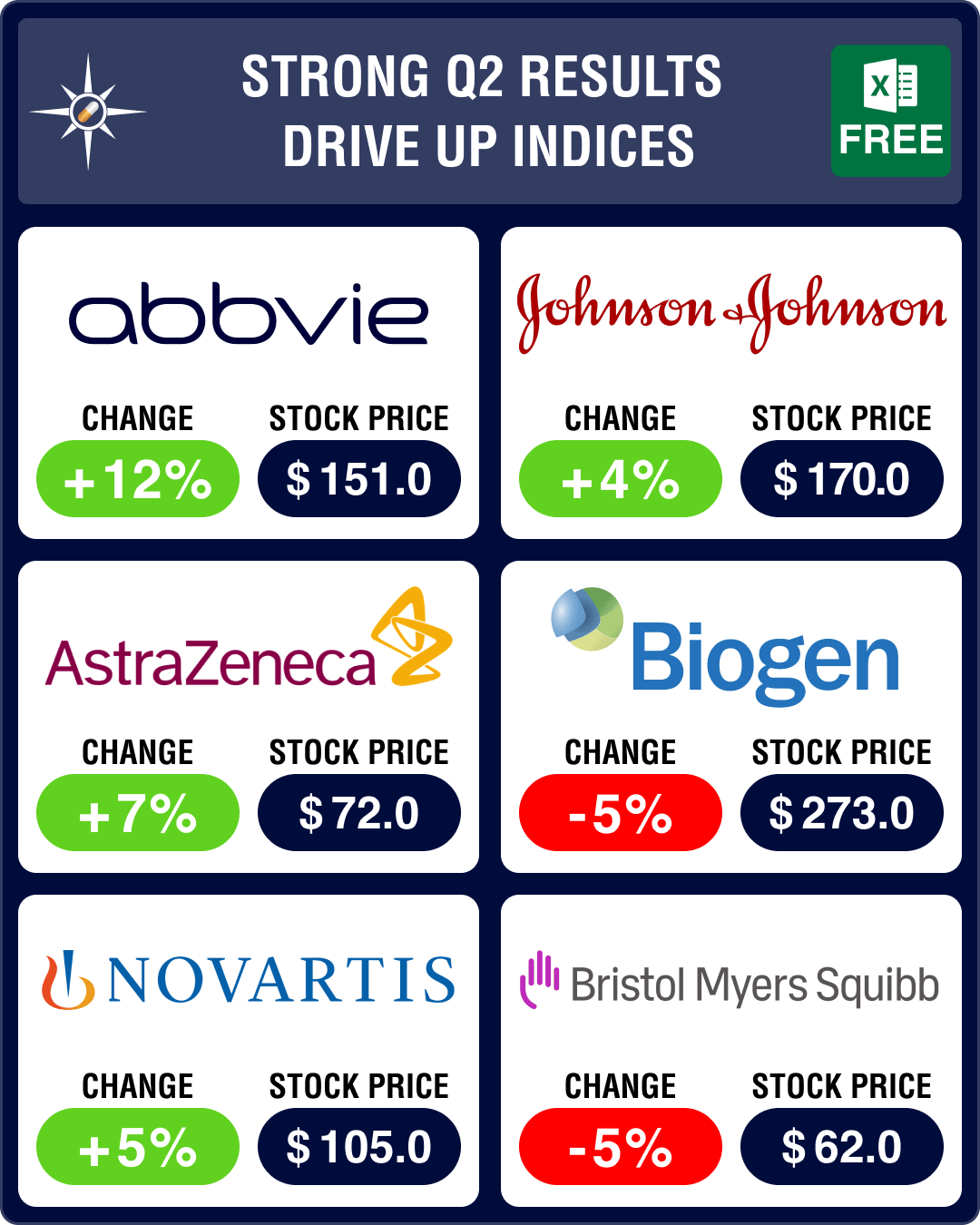
By PharmaCompass
2023-08-03
Impressions: 3397
July saw all three biotech indices inch up by 2 percent as several drugmakers announced their second quarter (Q2) results. Overall, most drugmakers posted better than expected Q2 results, with some even raising their guidance for 2023.
During July, the Nasdaq Biotechnology Index (NBI) was up 2 percent, at US$ 4,129.98, as opposed to a 0.7 percent drop in June. The SPDR S&P Biotech ETF index was up 2 percent, at US$ 84.29, as opposed to a 1.8 percent drop in June. And the S&P Biotechnology Select Industry Index (SPSIBI) was also up 2 percent, at US$ 6,544.43, as opposed to a 2.9 percent drop in June.
The month witnessed four deals of over US$ 1 billion. Towards July-end, Biogen announced the acquisition of Reata Pharmaceuticals for US$ 7.3 billion. Through this acquisition, Biogen will bolster its neuromuscular and rare disease portfolio. The announcement led to a 61 percent jump in Reata’s stock.
In mid-July, Eli Lilly bolstered its weight-loss portfolio with the acquisition of New York-headquartered biopharma Versanis Bio for a potential value of US$ 1.93 billion. Novartis announced the acquisition of DTx Pharma for US$ 1.0 billion. And on July 28, AstraZeneca’s rare diseases arm — Alexion — announced it has agreed to buy Pfizer’s early-stage rare disease gene therapy portfolio for up to US$ 1 billion, plus royalties on sales.
Access the Pipeline Prospector Dashboard for July 2023 Newsmakers (Free Excel)
AbbVie stock posts gains despite drop in Humira sales; J&J’s Darzalex sales up 22%
The last quarter was a good one for most drugmakers, and companies like AbbVie, Novartis and Johnson & Johnson (J&J) managed to beat estimates for both earnings and sales.
In the month of July, seven biosimilars to AbbVie’s Humira got launched in the US market. As a result, Humira sales plummeted 25.2 percent during the quarter (at US$ 4.01 billion). However, AbbVie’s Q2 sales, at US$ 13.86 billion (a drop of 5 percent), topped investor expectations. This resulted in a 12 percent increase in AbbVie’s stock in July.
There was more good news from the American drugmaker. In Europe, AbbVie received positive Committee for Medicinal Products for Human Use (CHMP) opinion for epcoritamab for the treatment of relapsed/refractory diffuse large B-cell lymphoma. The drug had bagged US Food and Drug Administration (FDA) approval in May 2023.
J&J’s sales surged 6.3 percent in Q2, at US$ 25.5 billion, compared to US$ 24.2 billion in Q2 2022. The company’s global pharmaceutical revenue reached US$ 13.7 billion, driven significantly by the success of its oncology drug Darzalex, which posted a 22.4 percent jump in Q2 sales. Danish biotech Genmab received royalties from global Darzalex sales and its stock rose 11 percent during July.
Carvykti, J&J’s CAR-T therapy for blood cancer (developed in partnership with Legend Biotech), reported robust Q2 sales of US$ 117 million, compared to US$ 24 million in Q2 2022. While J&J’s stock was up 4 percent, Legend’s stock rose 10 percent in July.
Meanwhile, J&J’s Janssen reported positive phase 3 results for Rybrevant (amivantamab-vmjw) used on top of chemotherapy in patients with newly diagnosed NSCLC with EGFR exon20 insertion mutations. The company received FDA’s accelerated approval in 2021. Now, with positive trial results, the company hopes to win full approval and extend the drug to newly diagnosed patients.
Access the Pipeline Prospector Dashboard for July 2023 Newsmakers (Free Excel)
Oncology drugs boost Astra’s Q2 sales; BMS, Biogen post drop in quarterly revenues
AstraZeneca (stock up 7 percent) reported a total revenue increase of 9 percent at US$ 11.41 billion, compared to US$ 10.77 billion in Q2 2022. The growth was mainly driven by increased demand for oncology medicines such as Tagrisso, Imfinzi and Calquence.
Astra-Merck’s Lynparza, in combination with abiraterone and prednisone/prednisolone, bagged conditional approval in Canada to treat BRCA-mutated metastatic castration-resistant prostate cancer.
Novartis (stock up 5 percent) announced strong sales growth of 7 percent (at US$ 13.62 billion) as a result of impressive performance of its heart failure drug Entresto, multiple sclerosis drug Kesimpta and cancer drugs Kisqali and Pluvicto. Novartis’ Sandoz division launched the first citrate-free high-concentration formulation of Hyrimoz, a Humira biosimilar. Sandoz also received a positive CHMP opinion for its multiple sclerosis biosimilar natalizumab. If approved, it will be the first-of-its-kind biosimilar in Europe for use in all indications of reference biologic Tysabri.
Amid these winners were two losers — BMS and Biogen. BMS (-5 percent) reported Q2 sales of US$ 11.22 billion that declined by 6 percent when compared to the previous year’s sales of US$ 11.88 billion. The decline prompted a cut in BMS’ full-year forecasts. This downturn comes as two of its top drugs — the multiple myeloma treatment Revlimid and the anticoagulant drug Eliquis — face competition from generics.
Biogen (-5 percent) posted a 3 percent drop in its Q2 revenue, with sales at US$ 2.45 billion compared to US$ 2.58 billion in Q2 2022. The decline is attributed to a loss in multiple sclerosis revenue, which decreased by 14 percent from last year, reaching US$ 1.20 billion. In positive news, Biogen and Eisai’s Leqembi became the first med for Alzheimer’s to bag FDA’s full approval.
Access the Pipeline Prospector Dashboard for July 2023 Newsmakers (Free Excel)
Astra-Sanofi’s RSV therapy, GSK’s jab bag approvals; Roche, Caribou post trial gains
In July, FDA granted approval to Sanofi-AstraZeneca’s respiratory syncytial virus (RSV) antibody therapy, Beyfortus (nirsevimab-alip), for newborns and infants. Moreover, GSK’s RSV vaccine — Arexvy — was approved by the UK health regulator in adults 60 years and older. Similarly, Moderna began its application process in the US, Australia and Europe to get an approval for its mRNA-1345 RSV vaccine in older adults. Despite positive news, Moderna stocks fell 3 percent.
In trials, Roche (stock up 3 percent) posted positive results from the trial of its subcutaneous version of Ocrevus, a treatment for multiple sclerosis. Additionally, Roche’s glofitamab became the first CD20xCD3 T-cell-engaging bispecific antibody to receive approval in Europe for relapsed or refractory diffuse large B-cell lymphoma (most common type of blood cancer). And Caribou Biosciences’ stock rose 100 percent on positive data from a phase 1 trial for its experimental CAR-T cell therapy CB-010 in relapsed or refractory B cell non-Hodgkin lymphoma, a type of blood cancer.
Access the Pipeline Prospector Dashboard for July 2023 Newsmakers (Free Excel)
Our view
Though pharma indices ended July on a stronger footing due to better-than-expected earnings, August opened with news that Pfizer has posted a whopping 54 percent drop in its Q2 revenues at US$ 12.7 billion, from US$ 27.72 billion in Q2 2022. Similarly, Merck reported a quarterly loss during the last quarter. While there are reasons why the two drugmakers haven’t performed well, and we also know that markets can be volatile, news on inflation easing off in some countries raises hopes that market conditions could improve in a few months.
Access the Pipeline Prospector Dashboard for July 2023 Newsmakers (Free Excel)
Pharma & Biotech Newsmakers in July 2023
| Company | Country | Currency | Market Cap (Bn) | Change In Market Cap (M) | Stock Price | Change In Price |
|---|
The PharmaCompass Newsletter – Sign Up, Stay Ahead
Feedback, help us to improve. Click here
Image Credit : Pharma & Biotech Newsmakers in July 2023 by PharmaCompass license under CC BY 2.0
“ The article is based on the information available in public and which the author believes to be true. The author is not disseminating any information, which the author believes or knows, is confidential or in conflict with the privacy of any person. The views expressed or information supplied through this article is mere opinion and observation of the author. The author does not intend to defame, insult or, cause loss or damage to anyone, in any manner, through this article.”







